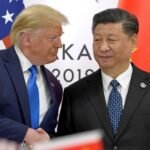(Dan Tri) – Thai Prime Minister Srettha Thavisin may face a new test of leadership capacity, when the release of Mr. Thaksin Shinawatra may increase political tensions.
Former Prime Minister Thaksin Shinawatra relaxes by the swimming pool at Chan Song La residence after being pardoned on February 18 (Photo: IG).
Political tensions in Thailand showed signs of escalating after former Prime Minister Thaksin Shinawatra was released and left the police hospital in central Bangkok on February 18, 6 months after he returned home after many years.
This development poses a challenge for Prime Minister Srettha, who must now prove his independence in decision-making and prove that Mr. Thaksin will not hold on to power.
Mr. Thaksin has long been considered the de facto leader of the ruling Pheu Thai party, currently headed by his youngest daughter, Paetongtarn Shinawatra.
Prime Minister Srettha faces challenges due to being new to politics less than 6 months before taking over as prime minister.
Prime Minister Srettha’s decision to release Mr. Thaksin is expected to cause tension within the party and could affect people’s unity with Pheu Thai.
Some analysts even predict the possibility of some power sharing from Mr. Srettha to Thaksin.
However, Prime Minister Srettha did not rule out the possibility of considering Mr. Thaksin’s proposals.
According to observers, proving his independence in decision-making remains a challenge for Prime Minister Srettha.
A pressing issue is the fate of the party’s flagship `10,000 baht digital wallet` policy.
Following recent warnings from the National Anti-Corruption Commission (NACC) against the scheme, its future is uncertain.
He said there may have been an agreement between Pheu Thai and the key coalition parties, in which they would alternately assume the prime ministership in exchange for support from other parties to facilitate Pheu Thai.
Following NACC’s warnings, coalition parties could use them as an excuse to block the plan.
Mr. Thaksin, 74 years old, left Thailand in 2008 and was sentenced to 8 years in prison for bribery and misconduct.
However, he never had to go to jail because on his first night in Bangkok detention prison, Mr. Thaksin was transferred to the Police General Hospital due to heart and lung problems.
In a statement, the Thai Department of Corrections said Mr. Thaksin was eligible for amnesty and the process of releasing the former prime minister was carried out in accordance with the law.
On February 18, the Thai Department of Corrections said that Mr. Thaksin was included in the list of prisoners eligible for special amnesty, including conditions such as being over 70 years old, seriously ill, disabled and having been in prison for at least 6 years.
The list of people eligible for amnesty is forwarded to the Thai Amnesty Committee for review and presented to the Thai Minister of Justice for approval.
`Anything can happen in Thai politics,` Mr. Jatuporn commented when talking about Mr. Thaksin’s release.
Observers believe that Mr. Thaksin will play an important role in politics even if he is not allowed to speak.










